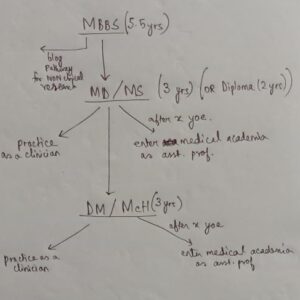This is an Interview with Ritam Pal transcribed by Damyanti Das Gupta of CoS.
Besides these existing options, some more options may be available in the next few years.
IIT Kanpur, IIT Kharagpur and IISC are now setting up a medical school. They are expected to introduce MD-PhD degrees to encourage the education of physician-researchers.
Many students, after completing their MBBS degree, do not want to go for further clinical specialization and become practicing clinicians.
If someone does not want to continue as a practicing doctor after MBBS and does not want to enter non-clinical academia either, then the most standard translational route would be pursuing an MD in preclinical or paraclinical subjects (Anatomy, Physiology, Biochemistry, Pathology, Microbiology, Pharmacology, Forensic Medicine, Community Medicine, etc.). One can also explore the option of completing an MD/MS degree, (and a DM/Mch degree too if required), and joining as a professor in any medical college. In this case, the research work that they do will be limited to medical and clinical research only.

A significant number of MBBS students want to transition to a non-clinical career after completing their degree. The following institutes can be an option for students willing to enter academia/ willing to explore careers in the biomedical industry.
IIT KHARAGPUR
Course: MMST ( Master of Medical Science and Technology)
Duration:3 years
- The eligibility criterion for admission to MMST students is a recognized MBBS Degree with a minimum of 55% marks in aggregate and having passed mathematics at 10+2 level.
- Selection is based on an entrance test that tests topics from the MBBS syllabus, and basic PCM.
- Pros– teaches biomedical engineering, has a good faculty, and has a good alumni base by now. Can go for Ph.D.abroad after completing this course.
- Cons– After this degree, the jobs available are mainly in medical tech companies(like Siemens), the salary range of which may not be that high. Also, many of the professors do not appreciate the requirements of students coming from an MBBS background.
Official Website:MMST @ IITKGP
IIT BOMBAY
Course: M.Tech in Biomedical Engineering
Duration:2 years
- Selection is based on All India level post-graduate entrance examination for corresponding disciplines such as INI_CET/NEET-PG/NEET-MDS/JIPMER/, and an interview.
- Pros – Has a good faculty and alumni base. The course is very well designed and electives are offered in biopotentials, medical sensors, biosensors, medical imaging physics, biomaterials, microfluidics, computational modeling, biomechanics, etc.
- Cons– jobs are scanty after this since M.Tech in BME is not well-accepted in the job market. Ph.D. after this is the more desirable option.
Official Website: MTech Program
IISC BANGALORE
Course: Ph.D
Duration 4.5-5 years.
- Admission is based on interview and application.
- Pros – For research-motivated students, this is the best research environment in India, with good guides and ample funding.
- Cons– Entry from an MBBS background is highly restricted. IISC prefers that MBBS students clear JEST or GATE, or secure ICMR junior fellowship, in order to join for Ph.D. These entrances can be difficult for MBBS students, who do not have much knowledge of topics like Biotechnology or Plant Biology (which are tested in these exams). Besides this, the stipend amount is much lesser than the salaries received by doctors.
Official Website: IISc Admissions
Nimhans Bangalore
- There are a number of courses related to neuroscience, Psychiatry, and clinical psychology, available to MBBS students. Which specific courses have the option for entry after MBBS can be found in their brochure: Prospectus 2021-22
- Pros– excellent faculty. Good research environment and future career prospects.
- Cons– The stipend offered to Ph.D. students is lesser than the average salary of a practicing doctor, which may be a reason of concern for many.
Besides these existing options, some more options may be available in the next few years.
IIT Kanpur, IIT Kharagpur, and IISC are now setting up a medical school. They are expected to introduce MD-PhD degrees to encourage the education of physician-researchers.
TATA memorial hospital has introduced ICMR-a funded, combined “MD Ph.D.” program very recently. Such institutes may be a good option in the future.
‘Whole world will benefit’: Dharmendra Pradhan lays foundation stone for IIT Kanpur’s medical school
Pic credits: High-resolution photo created by rawpixel.com – www.freepik.com








1 thought on “Research or Academia after Medicine (MBBS or MD) in India”
Top 10 medical colleges in India